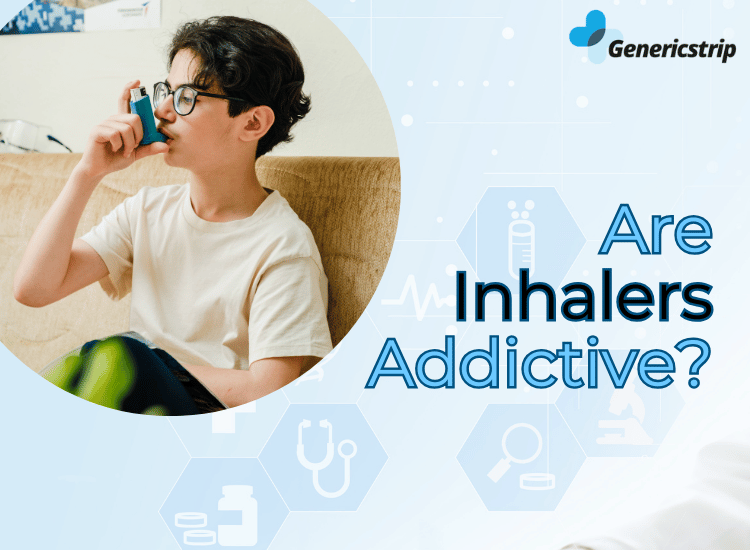If you or someone you know has recently been diagnosed with asthma and inhalers and is concerned about the potential for inhaler addiction, this comprehensive guide aims to address your questions.
What are Inhalers?
Inhalers are portable medical devices designed for the oral administration of medication, delivering drugs directly to the lungs to alleviate respiratory symptoms. They are primarily used to relieve conditions such as coughing, wheezing, and shortness of breath, enabling users to breathe normally.
Types of Inhalers
- Reliever Inhalers: These inhalers are commonly prescribed for immediate relief from asthma symptoms. They work by relaxing the muscles around the airways, facilitating improved respiration.
- Preventer Inhalers: These steroid-based inhalers aim to reduce airway inflammation and prevent the onset of respiratory symptoms.
- Combination Inhalers: These devices merge the benefits of both reliever and preventer inhalers, providing a comprehensive solution for respiratory ease.
- Rescuer Inhalers: These inhalers are intended for emergency situations when sudden breathlessness occurs, particularly when relievers are insufficient.
Medical Conditions Treated with Inhalers
Inhaler are commonly prescribed for respiratory disorders, including asthma, bronchitis, and chronic obstructive pulmonary disease (COPD).
What is addiction?
Addiction is a psychological response to a substance in which the individual develops an uncontrollable urge to use the medication, often resulting in harmful health consequences. Key indicators of addiction include a persistent craving for the substance, an inability to control its use, and continued consumption despite awareness of its risks.
Addiction can manifest as either physical or psychological dependence. Physical dependence occurs when the body adapts to the substance, leading to withdrawal symptoms upon cessation. Psychological dependence involves emotional reliance on the substance to manage daily stressors.
Signs of Addiction
- Persistent cravings for the substance
- Inability to regulate usage
- Continued use despite known risks
Addiction vs. dependency
While the terms “addiction” and “dependence” are often used interchangeably, they denote different phenomena. Addiction is characterized by compulsive behavior and cravings, whereas dependence refers to the body’s physical adaptation to a substance.
In the context of inhalers, psychological addiction is unlikely; however, the risk of physical dependence may arise from misuse. When used as directed by a healthcare provider, the likelihood of addiction or dependence is minimal.
Can a Person Become Addicted to Inhalers?
Asthma inhalers typically contain corticosteroids or bronchodilators, which are generally non-addictive. However, psychological dependence may develop if the inhaler is misused or overused. Following the prescribed treatment plan is essential to avoid the risk of dependence.
Some individuals may misuse inhaler in an attempt to alleviate anxiety related to respiratory issues, potentially leading to dependency. Adhering to the recommended dosage and frequency as advised by a physician is crucial for safety and efficacy.
What are the Signs of Addiction to Inhalers?
Individuals who have developed a psychological dependence may experience cravings for more frequent inhaler use due to emotional reliance. They may seek the medication even when not experiencing significant respiratory distress, leading to anxiety if the inhaler is not readily accessible.
What Happens if a Person Overuses Inhaler?
Overusing inhaler—defined as exceeding the physician-recommended dosage—can have severe health implications, including irregular heartbeat, tremors, and exacerbation of asthma symptoms. Prolonged misuse, particularly of corticosteroid inhaler, may result in significant side effects such as reduced bone density and impaired immune response.
In such situations, immediate medical attention is advisable.
Monitoring Your Inhaler Use
To prevent addiction or dependence, it is vital to monitor inhaler usage closely. Regular health assessments with a healthcare professional are recommended. Adhere strictly to the prescribed limits, and consult your physician if any irregularities arise.
How Can I Avoid Overusing Inhaler?
The most effective strategy to avoid overusing inhalers is to follow the dosage recommendations provided by your physician. Monitor your symptoms and behaviors related to inhaler use, and explore alternative methods for managing stress and anxiety, such as meditation or breathing exercises.
When to Seek Medical Attention
Consult your healthcare provider if you find yourself compelled to use the inhaler more frequently than prescribed. Additionally, seek medical advice if symptoms persist despite appropriate inhaler use or if any unusual symptoms occur.
Conclusion
Inhalers are legitimate treatment options for managing asthma, COPD, and bronchitis. Responsible usage is essential to mitigate any negative health effects, including the risk of addiction.
Having reviewed this information, you now have a clearer understanding of the potential for addiction to asthma inhalers.
FAQs
What Should I Do If I Accidentally Overuse Inhaler?
If accidental overuse occurs, consult your healthcare provider for assessment and appropriate guidance.
How Often Is It Safe to Use Inhaler?
The safety and efficacy of inhalers depend on adhering to the prescribed dosage frequency, which varies based on the type of inhaler and severity of symptoms.

